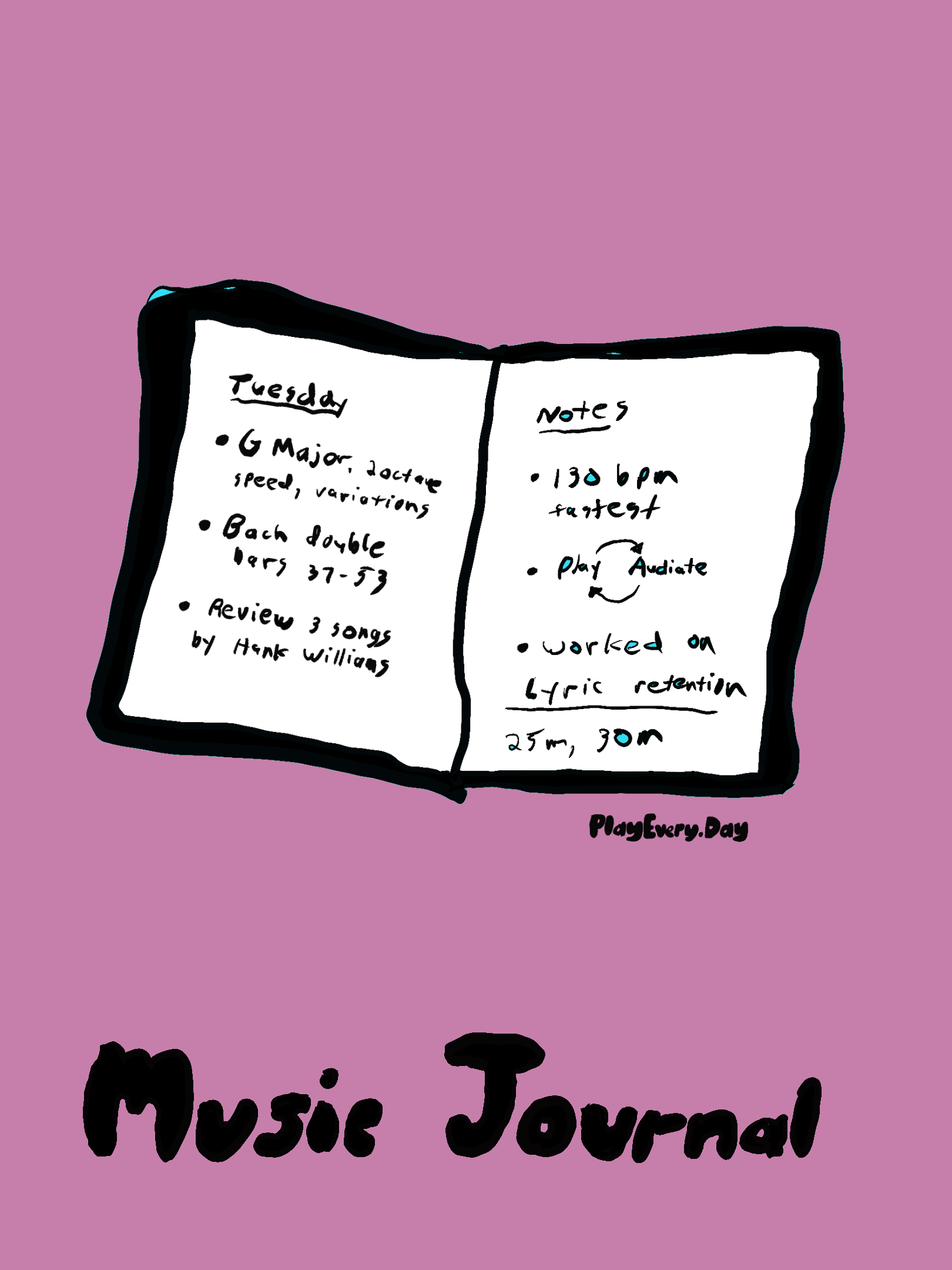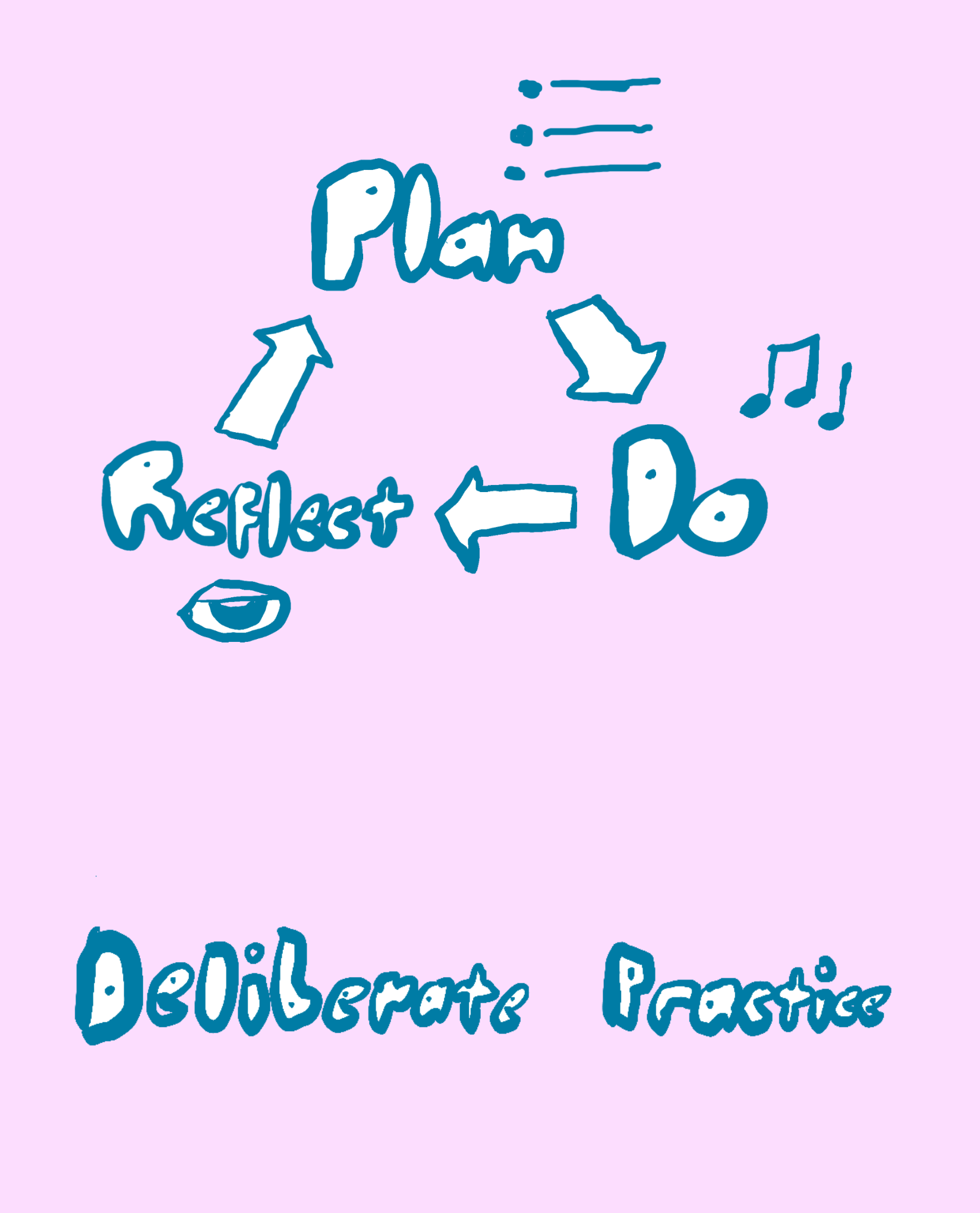

If you write about what you practiced today, you can go further tomorrow. Use a music journal to stay motivated, organized and focused.
The Three Basic Steps For Using A Music Practice Journal
- Plan
- Do
- Reflect
The Plan-Do-Reflect process is the essence of Deliberate Practice. Learn to do this multiple times during a single practice session. Now let’s take a closer look at each step.
Plan The Practice

Write down your intentions and goals for today’s practice session.
How do you know what to practice? Look in your journal to see what you did yesterday.
What still needs work? After warming up, dive right into a challenging part of a song or exercise.
What can you let rest? Maybe yesterday you played Arkansas traveler, and it was amazing. That means it would be best to take a day or two off. This spaced repetition will help you remember the song, and it also allows you to make better use of your practice time.
What will you practice today? This week?
Some folks like to have a weekly plan. I usually create a daily plan based on things I’ve done in the last few days. I’m open to changing the plan if it feels right.
My fIddlosophy is that plans and goals are a good way to focus your action in the present moment. However, I try to remain flexible because there’s no absolute truth in those goals and plans.
Do The Practice
At the very least, simply write down what you practice. I like to go a little further and detail what the hard parts are. Then the next day, I start with the hard parts. Doing this Deliberate Practice accelerates the pace of learning.
For example, you could practice just the hard parts of three different songs for five minutes each. In that way you make real progress with only fifteen minutes of practice.
If I’m working on building speed on something, I take note of the tempo range. For example, “Arkansas Traveller B Part, First Quarter 130-150 bpm.”
“The superior organization of information is a theme that appears over and over again in the study of expert performers.” –Peak: Secrets from the New Science of Expertise: Ericsson, Anders
That said, I’m not 100% focused on progress and results. I like to balance Deliberate Practice with exploration and play. These two mindsets compliment each other. If all you do is wander around, then you won’t develop skills and improve. But if you’re hyper-focused on technical improvement, then you don’t have fun, which ironically can hurt your progress as well.

As you practice, you might discover things that you want to focus on which were not part of your original plan. Follow your intuition and practice those things. Just be sure to take note of what you do.
Reflect On What You Practiced
At the end of your session, reflect on what you did. You may not even need to write anything down (but doing so can bring further awareness to your process).
If you notice that there’s something that you want to return to tomorrow, then take note of it. Maybe just highlight it or circle with a colored pencil.

During the wrap-up reflection ask yourself questions:
- What went well?
- What still needs work?
- What things can I take a break from?
- How did this session feel?
- Did I have a good mix of fun and focused practice?
Write about difficult feelings like doubt that arise during practice. Also write about the small wins that happen. This is a way to Overcome The Emotional Challenge. Keep going!
What should I use for a music journal?

The answer again is whatever works best for you. Some common tools:
- Old-fashioned paper notebook
- Word-processing or journal software (Google Docs, Word, etc. )
- Index cards
- Spreadsheet
- “Your Practice Journal” which allows you to write about what you practice. You can find this online journal at the bottom of any lesson page in the FiddleHed course.

FiddleHed Stephanie’s Master Practice List – Excel Template

I like to use a hybrid of a paper journal and an online note-taking app called Roam. I use Roam to store everything and for most daily practice. I’ve started keeping track of “practice sets’ (see below) using a paper journal. I can use this for my weekly “low-tech day” in which I take a break from screens, internetting.

I explain my “Music Zettlekasten” process in this podcast:
Practice Sets
Keep a current practice list of stuff that you practice over a period of 1-4 weeks. I like to focus on 1-2 skills, 8-10 songs (fiddle tunes, songs to sing, original compositions). Here’s an example:

When you feel ready to move on, slowly build an entirely new practice list. Once you’ve learned and improved everything on the second practice list, review a previous practice list. I find this to be an extremely efficient way to balance new learning with review.
I used to call this “Review sets,” but it makes more sense to call it a practice set. It reflects things I’m practicing now.
Master Practice List
Maintain a Master Practice List of everything you’ve learned. This helps you review stuff you’ve learned. Not only that, but it’s fun and gratifying to see the road you’ve travelled.

Part of building skills is returning to previously mastered skills. Take something you already learned and put it back on the workbench. The MPL helps you identify things that may be rusty.
Conclusion
Keeping a music journal will bring greater awareness to the process of practice. You’ll have a better idea of what to do when it’s time to practice. Find a way to do this that works for you. If you already use a music journal, then tell us about your process in a comment below 🤓

Further Learning
Two ways I can help you level up your fiddling
- Sign up for the FiddleHed newsletter below.
- Sign up for the Free Two-week Trial. You’ll get full access to all courses and group lessons. Plus, I’ll suggest some free lessons tailored to your current skill level.
Thanks for being here 🙏
